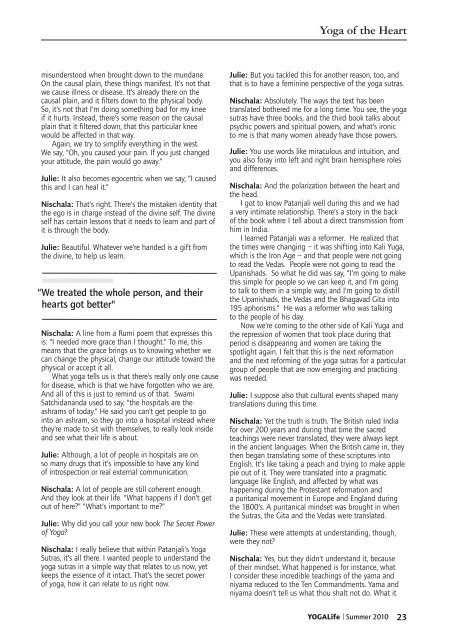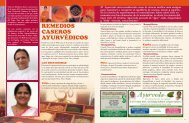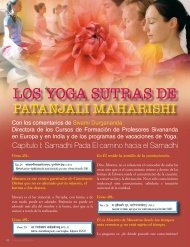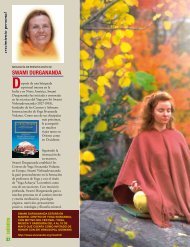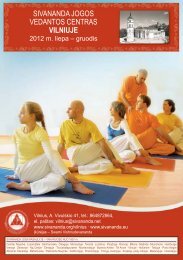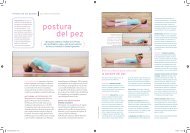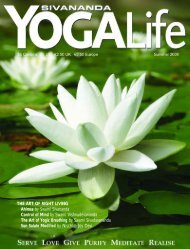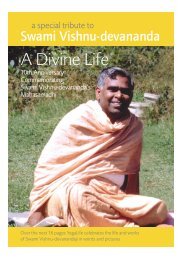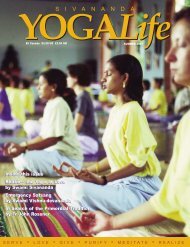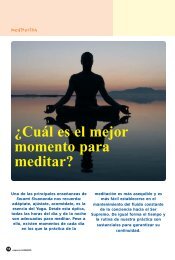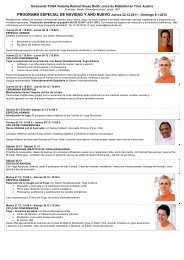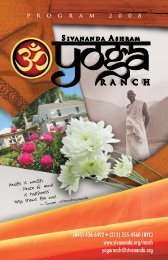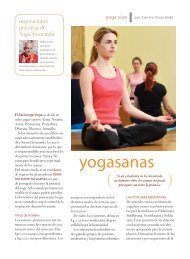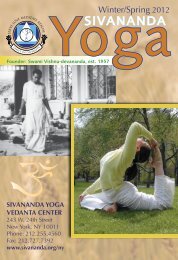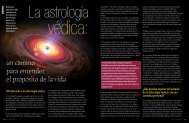YOGALife I Summer 2010 - Sivananda Yoga
YOGALife I Summer 2010 - Sivananda Yoga
YOGALife I Summer 2010 - Sivananda Yoga
You also want an ePaper? Increase the reach of your titles
YUMPU automatically turns print PDFs into web optimized ePapers that Google loves.
misunderstood when brought down to the mundane.<br />
On the causal plain, these things manifest. It’s not that<br />
we cause illness or disease. It’s already there on the<br />
causal plain, and it filters down to the physical body.<br />
So, it’s not that I’m doing something bad for my knee<br />
if it hurts. Instead, there’s some reason on the causal<br />
plain that it filtered down, that this particular knee<br />
would be affected in that way.<br />
Again, we try to simplify everything in the west.<br />
We say, “Oh, you caused your pain. If you just changed<br />
your attitude, the pain would go away.”<br />
Julie: It also becomes egocentric when we say, “I caused<br />
this and I can heal it.”<br />
Nischala: That’s right. There’s the mistaken identity that<br />
the ego is in charge instead of the divine self. The divine<br />
self has certain lessons that it needs to learn and part of<br />
it is through the body.<br />
Julie: Beautiful. Whatever we’re handed is a gift from<br />
the divine, to help us learn.<br />
“We treated the whole person, and their<br />
hearts got better"<br />
Nischala: A line from a Rumi poem that expresses this<br />
is: “I needed more grace than I thought.” To me, this<br />
means that the grace brings us to knowing whether we<br />
can change the physical, change our attitude toward the<br />
physical or accept it all.<br />
What yoga tells us is that there’s really only one cause<br />
for disease, which is that we have forgotten who we are.<br />
And all of this is just to remind us of that. Swami<br />
Satchidananda used to say, “the hospitals are the<br />
ashrams of today.” He said you can’t get people to go<br />
into an ashram, so they go into a hospital instead where<br />
they’re made to sit with themselves, to really look inside<br />
and see what their life is about.<br />
Julie: Although, a lot of people in hospitals are on<br />
so many drugs that it’s impossible to have any kind<br />
of introspection or real external communication.<br />
Nischala: A lot of people are still coherent enough.<br />
And they look at their life. “What happens if I don’t get<br />
out of here?” “What’s important to me?”<br />
Julie: Why did you call your new book The Secret Power<br />
of <strong>Yoga</strong>?<br />
Nischala: I really believe that within Patanjali’s <strong>Yoga</strong><br />
Sutras, it’s all there. I wanted people to understand the<br />
yoga sutras in a simple way that relates to us now, yet<br />
keeps the essence of it intact. That’s the secret power<br />
of yoga, how it can relate to us right now.<br />
<strong>Yoga</strong> of the Heart<br />
Julie: But you tackled this for another reason, too, and<br />
that is to have a feminine perspective of the yoga sutras.<br />
Nischala: Absolutely. The ways the text has been<br />
translated bothered me for a long time. You see, the yoga<br />
sutras have three books, and the third book talks about<br />
psychic powers and spiritual powers, and what’s ironic<br />
to me is that many women already have those powers.<br />
Julie: You use words like miraculous and intuition, and<br />
you also foray into left and right brain hemisphere roles<br />
and differences.<br />
Nischala: And the polarization between the heart and<br />
the head.<br />
I got to know Patanjali well during this and we had<br />
a very intimate relationship. There’s a story in the back<br />
of the book where I tell about a direct transmission from<br />
him in India.<br />
I learned Patanjali was a reformer. He realized that<br />
the times were changing – it was shifting into Kali Yuga,<br />
which is the Iron Age – and that people were not going<br />
to read the Vedas. People were not going to read the<br />
Upanishads. So what he did was say, “I’m going to make<br />
this simple for people so we can keep it, and I’m going<br />
to talk to them in a simple way, and I’m going to distill<br />
the Upanishads, the Vedas and the Bhagavad Gita into<br />
195 aphorisms.” He was a reformer who was talking<br />
to the people of his day.<br />
Now we’re coming to the other side of Kali Yuga and<br />
the repression of women that took place during that<br />
period is disappearing and women are taking the<br />
spotlight again. I felt that this is the next reformation<br />
and the next reforming of the yoga sutras for a particular<br />
group of people that are now emerging and practicing<br />
was needed.<br />
Julie: I suppose also that cultural events shaped many<br />
translations during this time.<br />
Nischala: Yet the truth is truth. The British ruled India<br />
for over 200 years and during that time the sacred<br />
teachings were never translated, they were always kept<br />
in the ancient languages. When the British came in, they<br />
then began translating some of these scriptures into<br />
English. It’s like taking a peach and trying to make apple<br />
pie out of it. They were translated into a pragmatic<br />
language like English, and affected by what was<br />
happening during the Protestant reformation and<br />
a puritanical movement in Europe and England during<br />
the 1800’s. A puritanical mindset was brought in when<br />
the Sutras, the Gita and the Vedas were translated.<br />
Julie: These were attempts at understanding, though,<br />
were they not?<br />
Nischala: Yes, but they didn’t understand it, because<br />
of their mindset. What happened is for instance, what<br />
I consider these incredible teachings of the yama and<br />
niyama reduced to the Ten Commandments. Yama and<br />
niyama doesn’t tell us what thou shalt not do. What it<br />
<strong>YOGALife</strong> I <strong>Summer</strong> <strong>2010</strong> 23


